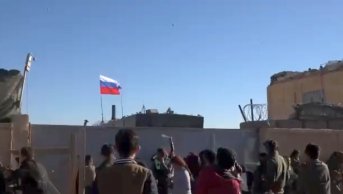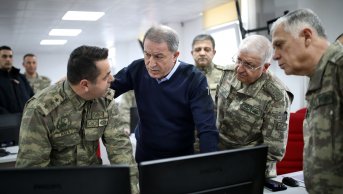Al-Bab in Euphrates Shield Operation and Aftermath

The Euphrates Shield Operation has reached a crucial stage. The city battle for capturing Al-Bab, the city at the target along with Manbij, has begun. In fact, the Euphrates Shield forces reached Al-Bab about two months ago. However, with the advance of the Euphrates forces towards the gate of the city, objections from some local and regional actors began to be made unprecedentedly. Due to Al-Bab's critical importance, both ISIS began to show high resistance, and the PYD/YPG, which does not want to miss the "historical opportunity" it caught, began to invest in Turkey's military failure to get the turn for Al-Bab. The PKK and ISIS acts in Turkey that increased in parallel to the siege of Al-Bab can be seen within this framework. There was no serious objection to the Euphrates Shield Operation until Al-Bab, and some contrarian voices began to be heard from Iran, Russia and the Syrian regime which had not opposed the Euphrates Shield Operation till the forces reached in Al-Bab.
The price may be heavier
As a result of the negotiations with Russia, the problem regarding Al-Bab was overcome and with the agreement signed by the two countries' air forces the operations started to be carried out in coordination. Later on, we witnessed that the Russians war crafts began to hit the ISIS targets in Al-Bab. However, the objections of Iran and the regime became concrete and four Turkish soldiers lost their lives as a result of an air strike performed by the regime in Al-Bab at the end of November, 2016. In the following days, before the attack, information about an unmanned aerial vehicle that belonged to the Iran-backed militia and that flied around the region was reflected in the media.
As a result of the operations by the Turkish army, ISIS militants were expected to leave Al-Bab and retreat towards Raqqa; nevertheless, the organization used this open line to strengthen its defence in the city, and sent more fighters. Turkey, in return, tried to weaken the organization with artillery shooting and air strikes from the outside for a long time. In consequence, on the night of 8 February 2017, the operation was launched in order to take the control of the city, and the forces belonging to the Free Syrian Army, backed up by Turkey, began to enter into the city centre from the western part. The number of the ISIS fighters in the city started decreasing due to the operations; however, it is believed that around 700 ISIS members have been deployed with a view to defending Al-Bab thanks to the reinforcements from Raqqa. Even though ISIS is in a remarkable tendency of losing power, its most significant strength is motivation. The organization has the capacity of encouraging its warriors to commit suicide attacks, which brings about both an increase in the number of victims and the prolongation of the process. It means that in the end the control of city will be taken by the FSA, but the price may be a little heavier.
The regime forces, parallel to the advance of the Turkish army and the FSA, also began to advance from the northern part of the city of Aleppo to Al-Bab. This progress has come to an end with their being bordering parties, and this has triggered conflicts between them. The fact that the regime and the FSA have become bordering parties means that there can be many incidents. Any local conflict can grow serious and reach higher levels. However, the escalation of tensions and the conflicts are unlikely to occur as both Turkey and Russia would take a stand to calm them down and encourage the parties to comply with the ceasefire. However, it should not be forgotten that there may be some actors in two sides who would like to sabotage the ceasefire. It is known that the Iranian Revolutionary Guards and some regime elements have taken a stand in order to carry on the war in Syria and been disturbed by the rapprochement between Turkey and Russia. The Regime-FSA encounter may offer a very suitable ground to sabotage the ceasefire in Syria and the Astana negotiations. The determinant concerning the encounter between the FSA and the regime forces will be how sincere Russia will be to prevent conflicts.
Future of the Euphrates Shield Operation
If the FSA takes the control of Al-Bab and the regime forces keep on their advance from the south, the road connecting Al-Bab and Aleppo can constitute the border between the parties. Indeed, there may be a few reasons why the regime may head towards Al-Bab. Even though a ceasefire has been reached with the Astana process and the will for the political solution has been revealed, the Turkish and Syrian sides do not trust each other. The regime and Iran may be willing to reach the PYD/YPG territories from the southern part of Al-Bab and to prevent the Euphrates Shield forces from moving towards the east and reaching Raqqa after having gained the control of Al-Bab. For the regime and Iran, Raqqa and Deir ez-Zor are not completely lost territories and they have been making plans to return to the said territories with greater confidence following Aleppo. For Iran, these regions are quite vital to ensure geographical linkage with Hashd al-Shaabi (Iran-backed militia group) in Iraq. The regime also looks for, insofar as possible, all the ways to get every inch of the Syrian land. Otherwise, it cannot be explained why the regime forces are still resisting in Deir ez-Zor although all the sides of the city have been surrounded by ISIS.
Despite all this, the progress of the regime towards Al-Bab from the south presents opportunities for Turkey as well. The intervention of the regime has cut off the supply line of ISIS from Raqqa and relieved Turkey and the FSA in Al-Bab. Furthermore, the deployment of the regime forces, along with the FSA, between the PYD/YPG regions, stands as a major blow to the "North Syrian Federation".
As President Erdogan has stated, it is not the case that the Euphrates Shield Operation would move further south. As the FSA takes the control of Al-Bab, the border with ISIS will remove and the new target will be the YPG. In terms of the fight against the YPG, the two regions come to the forefront in the first stage. The first is Manbij and the other one is Afrin. Turkey may have to act in coordination with the United States in Manbij and Russia in Afrin. The determinant in this process will be the way Trump will fight against ISIS in Syria. As Trump emphasized in his speech at the time he took over the Presidency, his priority in Syria and even in foreign policy will be the struggle against ISIS. In this respect, the Syrian policy of the United States may not greatly differ from the Obama Administration. Only the American support to the Syrian opposition which has been already limited will decrease. However, the way how the Trump Administration will fight against ISIS and which actors it will collaborate with will determine the fate of Manbij and the YPG regions in the east of the Euphrates. The first signs contradict one another. Trump and the authorities standing by his side voice positive messages regarding the relations between Turkey and the US, and cooperation with Turkey in Syria. However, the same authorities also emphasize the importance of the alliance with the YPG and that it should be maintained. Although the US will be forced to make a choice, it is likely to avoid such a choice. Probably, the cooperation with the YPG will continue, and all the countryside of Raqqa will be given to the YPG, and when an operation for the city centre of Raqqa is brought to the agenda, a plan including Turkey and more Arabs will be put on the table. While continuing to cooperate with the YPG, the US may also be in a "damage control" struggle for the Turkish side. The United States may want to make some "convincing" expansions to relieve Turkey over some concessions. From American perspective "even though Turkey is currently opposing, she can live with the new reality in the long run". In this respect, the relations between Turkey and the Iraqi Kurdish Region are given as an example. According to this, "Turkey opposed while the Iraqi Kurdish Region was founded too, but the problems were overcome over time and good relations were established." However, the problem that the US does not understand is that not a Kurdish but a "PKK region" is being established. Thus, this may mean that Turkey cannot be relieved by the given damage-control strategy.
Developments in Idlib
Another process in the northern Syria which is closely related to Turkey is taking place in Idlib. The rapprochement between Turkey and Russia, fall of Aleppo and finally the Astana process started a new debate between Idlib-based dissidents, and the deepening disagreement resulted in a hot conflict. The strongest group in Idlib, al-Nusra Front (recently called Jabhat Fateh al-Sham) and some other opposition groups insisted on the military solution. This has resulted in the unification of the opposing groups under the leadership of the al-Nusra Front and the formation of a new structure called "Hai'at Tahrir al-Sham". The opponents in the other group are in the process of coming together on the basis of acting together against the al-Nusra Front under the leadership of Ahrar el-Sham. This segment backs up the Astana process and probably consists of groups that are closer to Turkey. In terms of power balances, "Hai'at Tahrir al-Sham" is in a stronger position against the other group. Therefore, the continuation of the conflicts may result in Idlib’s being largely controlled by Al-Nusra Front. It is obvious that the Turkish position will be in favour of the bloc under the leadership of Ahrar el-Sham. However, the current division process does not involve pure risks for Turkey. One of the main elements of the Russo-Turkish consensus is the separation of moderate opponents from radicals such as ISIS and the Al-Nusra Front. The situation of the opposition groups in Idlib was so complicated that it was unclear how this distinction would be made and what kind of role Turkey would play. However, with the developments in Idlib the parties are getting clearer, and Turkey will proceed on her way with moderate opponents who support political solution.
This article was published on 18th of February, 2017, in Star Newspaper with the title of " Al-Bab in Euphrates Shield Operation and Aftermath".











